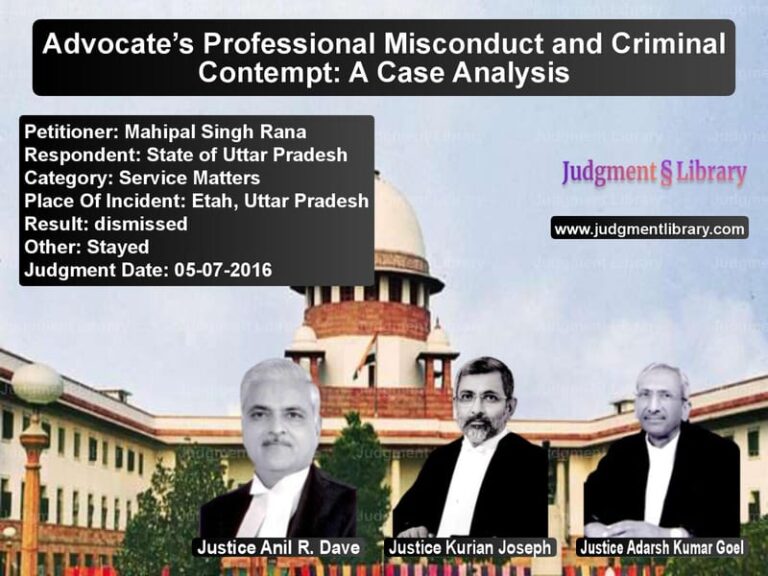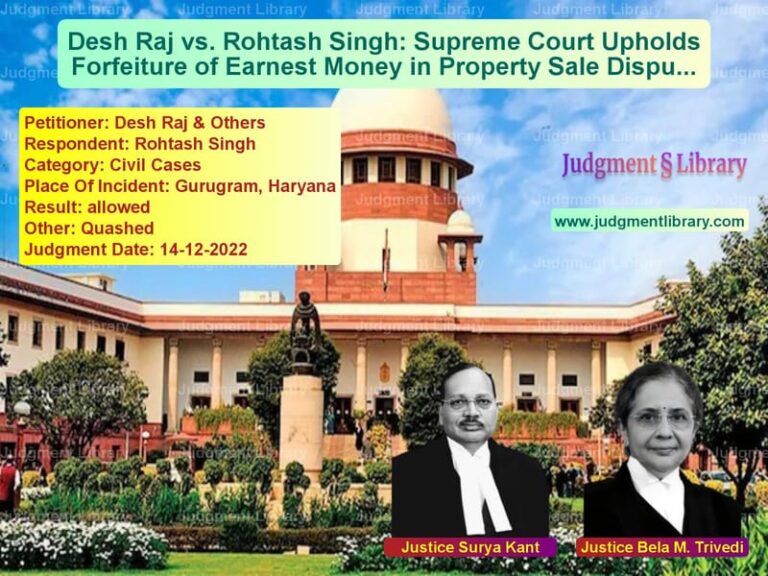Supreme Court Strikes Down Debarment and Penalty Imposed on Transformer Supplier
The Supreme Court of India, in the case of Isolators and Isolators vs. Madhya Pradesh Madhya Kshetra Vidyut Vitran Co. Ltd., ruled against the debarment and penalty imposed on the appellant, a transformer supplier. The case involved disputes over the supply of transformers under two purchase orders and the subsequent imposition of a three-year debarment and financial penalty.
The Court held that the debarment was unfair, especially when the electricity board had itself deferred supplies. The imposition of a maximum penalty was also deemed unlawful due to a lack of notice and justification. The ruling sets a significant precedent for government contracts and supplier rights.
Background of the Case
The appellant, Isolators and Isolators, is a proprietorship firm engaged in manufacturing and repairing transformers. It had been supplying transformers to government electricity boards for over 30 years. The dispute arose from two tenders:
- TS-494: A purchase order issued on June 30, 2017, for the supply of 586 transformers.
- TS-532: A purchase order issued on February 22, 2018, for the supply of 593 transformers.
The appellant claimed delays in receiving the purchase orders and approvals for designs, which affected its ability to meet deadlines. Moreover, a storm in August 2018 destroyed much of its raw materials, further impacting production.
Key Legal Issues
1. Whether the debarment of the appellant for three years was justified.
2. Whether the penalty imposed on unsupplied transformers was legal.
3. Whether the electricity board acted arbitrarily in canceling the contract and penalizing the appellant.
Arguments Presented
Petitioner (Isolators and Isolators) Arguments
- The debarment was illegal since the electricity board had deferred the supply and never formally resumed it.
- The delay in supply was due to circumstances beyond the appellant’s control, including delayed approvals and a natural disaster.
- No notice was given before imposing the penalty, violating principles of natural justice.
- The electricity board imposed the maximum penalty without explaining why the highest amount was necessary.
Respondents (Electricity Board) Arguments
- The appellant failed to supply the transformers within the contractually agreed period.
- The electricity board had the right to cancel the contract and impose penalties under the tender conditions.
- The debarment was necessary to ensure accountability and prevent future defaults.
Supreme Court’s Observations
The Supreme Court, led by Justices Dinesh Maheshwari and Sanjay Kumar, made the following key observations:
- The electricity board had deferred supply but never communicated further instructions. It was unfair to hold the appellant responsible for non-supply.
- No notice was given before imposing a penalty, violating the principle of natural justice.
- The penalty was arbitrarily set at the maximum rate without justification.
- The debarment was excessive and disproportionate to the alleged breach.
The Court noted:
“The respondents themselves informed the appellant that taking of balance delivery was being deferred (until further instructions). There had not been any other communication or even indication from the respondents which would have informed the appellant to resume supplies.”
Read also: https://judgmentlibrary.com/supreme-court-quashes-re-investigation-order-in-insurance-bribery-case/
Final Judgment
The Supreme Court ruled as follows:
- The three-year debarment was set aside, and the appellant was free to participate in future tenders.
- The penalty of Rs. 27,98,960 was quashed. Any recovered amount must be refunded within a month, failing which interest at 9% per annum would apply.
- The cancellation of the contract was not challenged and, therefore, remained in force.
Implications of the Judgment
The ruling has significant implications for suppliers dealing with government contracts:
- Protection against arbitrary debarment: Government agencies cannot blacklist suppliers unfairly.
- Importance of clear communication: If supply is deferred, agencies must inform suppliers when to resume.
- Penalties must be justified: Maximum penalties cannot be imposed without a valid explanation.
- Reinforcing natural justice: No financial penalty should be imposed without prior notice.
Conclusion
The Supreme Court’s ruling in Isolators and Isolators vs. Madhya Pradesh Madhya Kshetra Vidyut Vitran Co. Ltd. is a significant victory for fairness in government contracts. By striking down the unjust debarment and penalty, the Court reaffirmed the principles of natural justice and contractual fairness.
The judgment ensures that suppliers are treated fairly and that government agencies act transparently in contract enforcement. It serves as a crucial precedent for future disputes involving public procurement and supplier rights.
Petitioner Name: Isolators and Isolators.Respondent Name: Madhya Pradesh Madhya Kshetra Vidyut Vitran Co. Ltd..Judgment By: Justice Dinesh Maheshwari, Justice Sanjay Kumar.Place Of Incident: Madhya Pradesh.Judgment Date: 18-04-2023.
Don’t miss out on the full details! Download the complete judgment in PDF format below and gain valuable insights instantly!
Download Judgment: isolators-and-isolat-vs-madhya-pradesh-madhy-supreme-court-of-india-judgment-dated-18-04-2023.pdf
Directly Download Judgment: Directly download this Judgment
See all petitions in Contract Disputes
See all petitions in Corporate Compliance
See all petitions in unfair trade practices
See all petitions in Judgment by Dinesh Maheshwari
See all petitions in Judgment by Sanjay Kumar
See all petitions in allowed
See all petitions in Quashed
See all petitions in supreme court of India judgments April 2023
See all petitions in 2023 judgments
See all posts in Corporate and Commercial Cases Category
See all allowed petitions in Corporate and Commercial Cases Category
See all Dismissed petitions in Corporate and Commercial Cases Category
See all partially allowed petitions in Corporate and Commercial Cases Category







